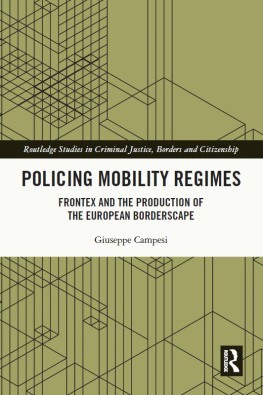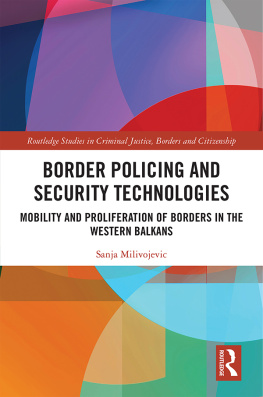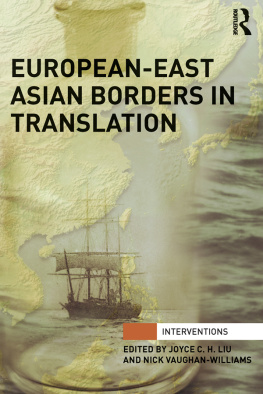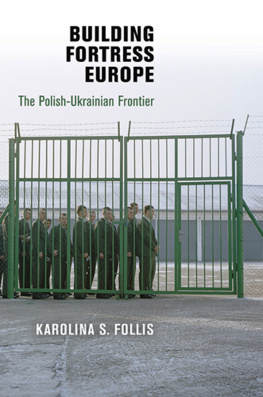In a truly transdisciplinary feat, Campesi has mobilized the disciplines of international relations, European law, and the social sciences, to project an impressive light on the processes of construction of a new European Leviathan through the lens of FRONTEX, the new European Border Agency, for the first time scrutinized in all its many, and often peculiar, dimensions.
Dario Melossi,
Professor of Criminology, University of Bologna
This book is a must-read for anyone impelled to critically engage and gain a better understanding of the complex multilevel border regimes in the European Union. Through the lenses of an in-depth study of the EU Frontex Agency, the book compellingly shows how emerging EU policing mobility regimes feature inherent controversies affecting their legitimation. These relate to their intrinsic antinomies with the safeguarding of individuals human dignity and democratic rule of law principles which lay at the roots of the EU constitutional framework.
Sergio Carrera,
Head of the Justice and Home Affairs Programme at CEPS
Since its establishment in 2005, Frontex has deeply reframed the management of European borders, orchestrating the operations of national and private actors within an emerging post-national pattern. Giuseppe Campesi provides a brilliant and compelling analysis of such shift, focusing both on the agency itself and on the ensuing implications for matters of space, security, social stratification and hierarchies. A must-read for anyone interested in border, security, migration and EU studies.
Sandro Mezzadra,
co-author of Border as Method, or, the Multiplication of Labor
Policing Mobility Regimes
More than 30 years after its birth, the Schengen area of free movement is under siege in Europe: new barriers are being erected along land borders, military assets are increasingly deployed to patrol the Mediterranean, and sophisticated surveillance tools are used to keep track of the flows of people crossing into European space.
Bringing together perspectives from political geography, critical criminology and legal theory, Policing Mobility Regimes offers a systematic analysis of the impact that Frontex is having on migration control strategies at the EU level and offers a detailed empirical description of the agencys organization and operational activities. In addition, this book explores the meaning behind the attempt at developing a post-national border control strategy and what effect this might have on the geopolitics of Europes borders. It contributes to the wider theoretical debate on the relationships among migration, security and the transformation of borders in contemporary Europe.
An accessible and compelling read, this book will appeal to all those engaged with criminology, sociology, geography, politics and law as well as all those interested in learning about Europes changing borders.
Giuseppe Campesi is professor of law and society at the Department of Political Sciences, University of Bari Aldo Moro, Italy. His research cuts across different disciplines focusing mainly on contemporary social theory, critical legal studies, critical criminology, border controls and migration policies.
Routledge Studies in Criminal Justice, Borders and Citizenship
Globalizing forces have had a profound impact on the nature of contemporary criminal justice and law more generally. This is evident in the increasing salience of borders and mobility in the production of illegality and social exclusion. Routledge Studies in Criminal Justice, Borders and Citizenship showcases contemporary studies that connect criminological scholarship to migration studies and explores the intellectual resonances between the two. It provides an opportunity to reflect on the theoretical and methodological challenges posed by mass mobility and its control. In so doing, it charts an intellectual space and establishes a theoretical tradition within criminology to house scholars of immigration control, race and citizenship, including those who traditionally publish either in general criminological or in anthropological, sociological, refugee studies, human rights and other publications.
Edited by
Mary Bosworth, University of Oxford
Katja Franko, University of Oslo
Sharon Pickering, Monash University
Border Policing and Security Technologies
Mobility and Proliferation of Borders in the Western Balkans
Sanja Milivojevic
Re-thinking the Political Economy of Immigration Control
A Comparative Analysis
Lea Sitkin
Border Frictions
Gender, Generation and Technology on the Frontline
Karine Ct-Boucher
Policing Mobility Regimes
Frontex and the Production of the European Borderscape
Giuseppe Campesi
For more information about this series, please visit: https://www.routledge.com/criminology/series/CJBC
First published 2022
by Routledge
2 Park Square, Milton Park, Abingdon, Oxon OX14 4RN
and by Routledge
605 Third Avenue, New York, NY 10158
Routledge is an imprint of the Taylor & Francis Group, an informa business
2022 Giuseppe Campesi
The right of Giuseppe Campesi to be identified as author of this work has been asserted by him in accordance with sections 77 and 78 of the Copyright, Designs and Patents Act 1988.
All rights reserved. No part of this book may be reprinted or reproduced or utilised in any form or by any electronic, mechanical, or other means, now known or hereafter invented, including photocopying and recording, or in any information storage or retrieval system, without permission in writing from the publishers.
Trademark notice: Product or corporate names may be trademarks or registered trademarks, and are used only for identification and explanation without intent to infringe.
British Library Cataloguing-in-Publication Data
A catalogue record for this book is available from the British Library
Library of Congress Cataloging-in-Publication Data
A catalog record has been requested for this book
ISBN: 978-0-367-26115-3 (hbk)
ISBN: 978-1-032-07654-6 (pbk)
ISBN: 978-0-429-29154-8 (ebk)
DOI: 10.4324/9780429291548
Typeset in Bembo
by KnowledgeWorks Global Ltd.






